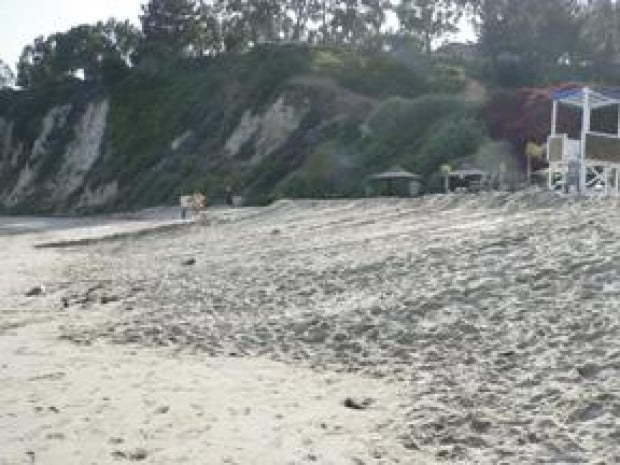
The unpermitted movement of sand at Paradise Cove Beach could potentially hurt grunion population.
By Dena Feingold / Special to The Malibu Times
Illegal bulldozing of sand at Paradise Cove Beach was reported to the city last week. Malibu City officials received a phone call last Wednesday about a tractor at the beach that was moving sand around in front of Paradise Cove Beach Café. Photos taken by a local resident show track marks from a bulldozer or tractor running from the shoreline to the restaurant. Malibu does not allow mechanized equipment on the sand without a permit and a permit was not issued for the bulldozing activity, city officials said.
Gail Sumpter, city permit services manager, said the city received an anonymous phone about the bulldozing of sand. The city dispatched Lisa Tent, community services specialist/code enforcement, to the beach to follow up on the call. By the time Tent had reached the location, the earth moving had ceased. Tent told the property owner’s representative that “they should not being doing that” and would notify them in writing as well. Although she would not say who the owner was, Sumpter said it was safe to make the assumption that the property owner of the beach in front of the café was responsible for moving the sand.
Steve Dahlberg, president of the Kissel Company, which owns the beachside property, could not be reached for comment.
Bob Morris, owner of Paradise Cove Beach Café, said he didn’t know anything about the bulldozing occurring in front of the restaurant.
“They moved the lifeguard tower out,” Morris said.
Although no permanent damage was reported, the beach modification/grooming has the potential to affect the grunion population, said Dr. Karen Martin, a Pepperdine University marine biology professor, whose work has focused on this species of marine fish. “If they were pushing up sand in areas where the grunion eggs were, and if there were grunion eggs there, then it would damage them.”
This is the closed season for grunions, Martin said, with peak spawning periods taking place in April, May and June.
“At this point, the beaches are considered a potential for habitat because they are required for the spawning of the grunions,” Martin said. “If people feel like they absolutely have to do work, they should monitor for grunions ahead of time; [however], it’s best to avoid the area if there are grunions there.”
The professor said there have been reports of grunion runs in Paradise Cove in the past.
A common occurrence
Illegal bulldozing/grading is a fairly common violation in Malibu and in the Santa Monica Mountains, said Pat Veesart, Southern California enforcement supervisor at the California Coastal Commission. “It happens all the time-I am sure it happens within the city limits and the city code enforcement people deal with it regularly, and we also deal with it regularly,” Veesart said.
Malibu is the primary enforcement authority of violations within the city limits, Veesart said. “Often people call me with a violation and I’ll refer it to the city’s code enforcement people for action,” he said. “The code enforcement people are pretty good about responding to them.”
However, the Coastal Commission does become involved in violations within the city limits if the city does not respond to a violator or if the city requests the Coastal Commission’s involvement.
Another way the Coastal Commission would become directly involved is if the violation is occurring in an area of retained jurisdiction or original jurisdiction, and that would be any place below the mean high tide line, Veesart said. “Typically, work on beaches is a situation where we will get directly involved,” he said. “We remain the watchdog agency that overseas activity in the coastal zone.”
In fact, the state, on behalf of the California Coastal Commission and the State Lands Commission, sued the Trancas Property Owners Association in 2005 over illegal sand movement at Broad Beach. Property owners there had hired bulldozers to build berms in front of beachfront homes, without obtaining the necessary coastal permits.
A Coastal Commission office said that the illegal sand movement prevented public access to the beach, caused state-protected fish eggs to be washed to sea, damaged rare sand dunes and flaunted numerous permit laws.
That case, which involves beach access issues as well, is still in litigation.
Although the city does not intend to pursue penalties regarding the bulldozing last week, the Coastal Commission inquired about how extensive the bulldozing was and photos of the activity were forwarded to the agency.
“We are in grunion season now,” Veesart said. “So this is potentially a serious violation.”
